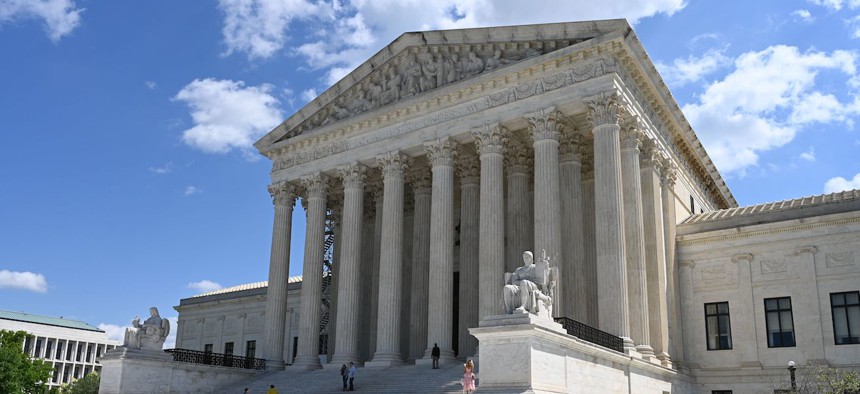
The U.S. Supreme Court building shown here on April 23, 2023. The Chevron deference was established in a 1984 Supreme Court case. DANIEL SLIM/AFP via Getty Images
Federal Agency Expertise Faces a Challenge at the Supreme Court
The Chevron Deference, established in 1984, says courts should defer to federal agencies’ interpretation of an ambiguous or unclear statute that they administer.
The Supreme Court announced Monday that it would hear challenges to a 39-year-old doctrine that says courts should defer to federal agencies’ interpretation of an ambiguous or unclear statute that they administer.
The Chevron deference, established in a 1984 Supreme Court case, is something the court has had an “increasingly chilly orientation to” since 2000, two experts wrote last summer. In this case, New Jersey fishermen are challenging the federal government’s ability to force them to pay monitoring fees, which their legal team says is unlawful without congressional approval.
At issue is “whether the court should overrule Chevron v. National Resources Defense Council, or at least clarify that statutory silence concerning controversial powers expressly, but narrowly granted elsewhere in the statute does not constitute an ambiguity requiring deference to the agency,” said SCOTUSblog.
Ryan Mulvey, counsel at the Cause of Action Institute, a nonprofit working to enhance individual and economic liberty to limit the administrative state and part of petitioners’ legal team, said, “the Supreme Court has an opportunity to correct one of the most consequential judicial errors in a generation.” The doctrine “has proven corrosive to the American system of checks and balances and directly contributed to an unaccountable executive branch, overbearing bureaucracy, and runaway regulation.”
The Commerce Department, whose top officials are the defendants in the case, did not respond for comment. The Justice Department declined to comment.
However, in a brief filed in February DOJ officials underscored the use and precedent of Chevron.
“By centralizing interpretive decisions in agencies supervised by the president, Chevron also promotes political accountability, national uniformity, and predictability, and it respects the expertise agencies can bring to bear in ad-ministering complex statutory schemes,” they wrote.
“Practically Legally Gratuitous”
“The court's conservatives (as well as those on the lower courts) have already made clear that they feel no constraints from Chevron (or separation of powers for that matter),” James Goodwin, senior policy analyst at the Center for Progressive Reform, tweeted. This includes the “major questions doctrine” established by the Supreme Court last summer, which set a precedent that federal agencies could have little flexibility to create new regulations with major economic or political significance that rely on authorities not clearly laid out in law.
“Overruling Chevron at this point would be practically legally gratuitous,” Goodwin added.
Scott Nelson, an attorney at the consumer advocacy nonprofit, Public Citizen,, said the high court “has a way of granting cases to decide big questions and then getting cold feet, and they can still decide this case on a less sweeping basis.”
However, if it were to overturn Chevron, “it would subject agencies to much more judicial second guessing and effectively negate Congress’s decision to leave filling in the details of statutory schemes to expert agencies,” he said. “The trend in the court’s recent decisions of deciding these kinds of cases without mentioning Chevron may have much the same effect, making Chevron increasingly irrelevant without overruling it.” Nelson stressed the need to keep Chevron because it is a “check” on courts to not be swayed by their ideological leanings.
On the other side, Thomas Berry, research fellow at the Cato Institute’s Robert A. Levy Center for Constitutional Studies, who submitted an amicus brief in support of the petitioners, said Chevron needs to be overturned because it’s unconstitutional. It gives judicial power to the administrative state despite the Constitution giving all judicial power to the Judicial Branch and “it biases the courts towards executive agencies, stripping the judiciary of impartiality and denying litigants due process.”
In a study for the amicus brief he and his colleagues submitted “we found that federal courts of appeal still defer under Chevron regularly, even though the Supreme Court itself rarely defers anymore,” said Berry. “This demonstrates that even if applying Chevron deference may be disfavored at the Supreme Court, the Chevron Doctrine will not fade away completely until the Supreme Court explicitly over-rules it.”
Republicans have introduced legislation in recent years to rein in Chevron, and although it passed the House in July 2016, they haven’t been successful.
NEXT STORY: OPM Has a Plan to Upgrade Federal Employee Data







